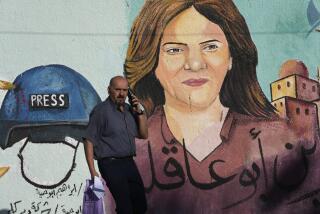Egyptian Editors Feel Noose Tightening on Newspapers
- Share via
CAIRO — Newspaper editor Magdy Hussein spent most of last year trying to persuade his readers that the country’s top police official, Interior Minister Hassan Alfi, was corrupt. By year’s end, Alfi was out of the Cabinet and President Hosni Mubarak had invited Hussein to join him on an official trip abroad.
A triumph for the power of the press in Egypt? Not quite. Since then, Hussein has been convicted on criminal libel charges for his reports.
The imprisonment of Hussein and two other journalists last month has sent a chill through the ranks of the Egyptian press.
What began as isolated official complaints about “sensationalism” in newspapers has turned into the most severe clampdown on press freedom in years in Egypt.
Besides the three now in prison, four journalists have been sentenced to terms of up to one year and are appealing their verdicts, and about 70 others are facing investigations that could lead to prison, according to the Cairo-based Center for Human Rights Legal Aid.
In other developments, one of the country’s most popular independent papers, Al Destour, was ordered closed after it reported a purported death threat by Islamic militants against Christian businessmen; and a prominent editor for a government-owned newspaper was reassigned after irking officials.
Because Egypt has been a pioneer of press freedom in the Arab world, these moves have resonance beyond the country’s borders: If Egypt is seen to be clamping down on its journalists, life will probably become more difficult for journalists in other Arab countries.
Lively, unfettered and frequently obnoxious, Egypt’s newspapers have lampooned officials for feeding at the public trough and chastised do-nothing parliament members. They have taken special delight in social criticism, poking fun at Egypt’s new class of mobile-phoned, super-rich capitalists who glide through Cairo in curtained limousines while so many remain poor.
But the press is also accused of excesses and abusing the truth. Because of press reports here, many Egyptians take for granted that the crash that killed Dodi Fayed and Princess Diana last year was engineered by the British secret service, that Israeli doctors have injected Palestinian children with AIDS and that Satan-and-sex cults have mushroomed among Cairo’s youth.
Moreover, some newspaper owners have used their news columns to carry on personal vendettas against business rivals. Because of a legal loophole that allows essentially Egyptian papers to be printed under a foreign license and then imported, the number of publications available exploded here in recent years. Many of the new papers have thrived by giving readers a steady diet of crime, titillation and gossip with scant regard for accuracy and fairness.
It is the “yellow” papers that the government says it is trying to restrict, arguing that they are harming society and tarnishing Egypt’s image.
But Gasser Abdel Razek, executive director of the Center for Human Rights Legal Aid, said he believes that such complaints about journalistic standards are merely a pretext and that the government is really seeking to tighten its control over the press at a time when economic reforms are loosening the authorities’ hold over other areas of life.
“They want to keep their grip on anything that they can,” he said. “They really think of the media in general as a national security issue.”
As editor in chief of the Islamist-oriented Al Shaab, Hussein is the clampdown’s most prominent target. He and cartoonist Muhammad Helal began a one-year prison term in March for libeling Alfi and his two sons during the yearlong campaign accusing them of amassing a fortune through corruption.
Alfi was fired as interior minister after the terrorist attack against foreign tourists near Luxor last November, but he had already been put under a political cloud because of Al Shaab’s accusations.
Also in March, Gamal Fahmy of the opposition Al Arabi newspaper began a six-month prison sentence for libeling a pro-government journalist.
Whether the three will serve out their sentences is unclear. There have been hints that the Journalists Syndicate, a professional union that is supposed to police its own membership, might broker a compromise leading to early parole.
More to Read
Sign up for Essential California
The most important California stories and recommendations in your inbox every morning.
You may occasionally receive promotional content from the Los Angeles Times.










